Minwoo Kim
SURE Guided Posterior Sampling: Trajectory Correction for Diffusion-Based Inverse Problems
Dec 29, 2025Abstract:Diffusion models have emerged as powerful learned priors for solving inverse problems. However, current iterative solving approaches which alternate between diffusion sampling and data consistency steps typically require hundreds or thousands of steps to achieve high quality reconstruction due to accumulated errors. We address this challenge with SURE Guided Posterior Sampling (SGPS), a method that corrects sampling trajectory deviations using Stein's Unbiased Risk Estimate (SURE) gradient updates and PCA based noise estimation. By mitigating noise induced errors during the critical early and middle sampling stages, SGPS enables more accurate posterior sampling and reduces error accumulation. This allows our method to maintain high reconstruction quality with fewer than 100 Neural Function Evaluations (NFEs). Our extensive evaluation across diverse inverse problems demonstrates that SGPS consistently outperforms existing methods at low NFE counts.
Joint Spectrum Sensing and Resource Allocation for OFDMA-based Underwater Acoustic Communications
Jun 16, 2025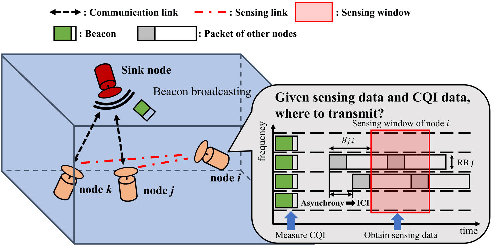
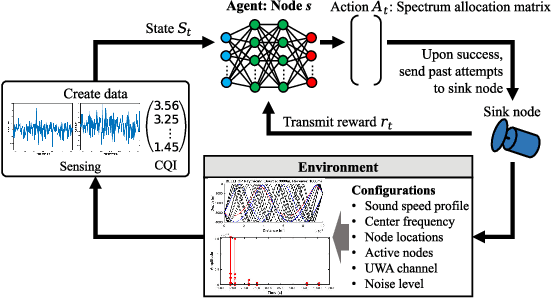
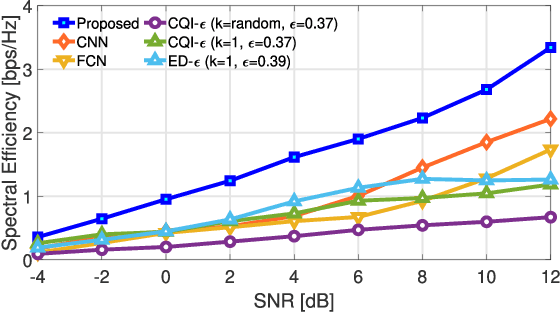
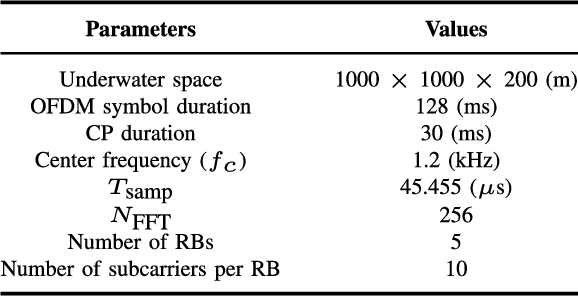
Abstract:Underwater acoustic (UWA) communications generally rely on cognitive radio (CR)-based ad-hoc networks due to challenges such as long propagation delay, limited channel resources, and high attenuation. To address the constraints of limited frequency resources, UWA communications have recently incorporated orthogonal frequency division multiple access (OFDMA), significantly enhancing spectral efficiency (SE) through multiplexing gains. Still, {the} low propagation speed of UWA signals, combined with {the} dynamic underwater environment, creates asynchrony in multiple access scenarios. This causes inaccurate spectrum sensing as inter-carrier interference (ICI) increases, which leads to difficulties in resource allocation. As efficient resource allocation is essential for achieving high-quality communication in OFDMA-based CR networks, these challenges degrade communication reliability in UWA systems. To resolve the issue, we propose an end-to-end sensing and resource optimization method using deep reinforcement learning (DRL) in an OFDMA-based UWA-CR network. Through extensive simulations, we confirm that the proposed method is superior to baseline schemes, outperforming other methods by 42.9 % in SE and 4.4 % in communication success rate.
RAPID: Robust and Agile Planner Using Inverse Reinforcement Learning for Vision-Based Drone Navigation
Feb 04, 2025Abstract:This paper introduces a learning-based visual planner for agile drone flight in cluttered environments. The proposed planner generates collision-free waypoints in milliseconds, enabling drones to perform agile maneuvers in complex environments without building separate perception, mapping, and planning modules. Learning-based methods, such as behavior cloning (BC) and reinforcement learning (RL), demonstrate promising performance in visual navigation but still face inherent limitations. BC is susceptible to compounding errors due to limited expert imitation, while RL struggles with reward function design and sample inefficiency. To address these limitations, this paper proposes an inverse reinforcement learning (IRL)-based framework for high-speed visual navigation. By leveraging IRL, it is possible to reduce the number of interactions with simulation environments and improve capability to deal with high-dimensional spaces while preserving the robustness of RL policies. A motion primitive-based path planning algorithm collects an expert dataset with privileged map data from diverse environments, ensuring comprehensive scenario coverage. By leveraging both the acquired expert and learner dataset gathered from the agent's interactions with the simulation environments, a robust reward function and policy are learned across diverse states. While the proposed method is trained in a simulation environment only, it can be directly applied to real-world scenarios without additional training or tuning. The performance of the proposed method is validated in both simulation and real-world environments, including forests and various structures. The trained policy achieves an average speed of 7 m/s and a maximum speed of 8.8 m/s in real flight experiments. To the best of our knowledge, this is the first work to successfully apply an IRL framework for high-speed visual navigation of drones.
PBVS 2024 Solution: Self-Supervised Learning and Sampling Strategies for SAR Classification in Extreme Long-Tail Distribution
Dec 17, 2024



Abstract:The Multimodal Learning Workshop (PBVS 2024) aims to improve the performance of automatic target recognition (ATR) systems by leveraging both Synthetic Aperture Radar (SAR) data, which is difficult to interpret but remains unaffected by weather conditions and visible light, and Electro-Optical (EO) data for simultaneous learning. The subtask, known as the Multi-modal Aerial View Imagery Challenge - Classification, focuses on predicting the class label of a low-resolution aerial image based on a set of SAR-EO image pairs and their respective class labels. The provided dataset consists of SAR-EO pairs, characterized by a severe long-tail distribution with over a 1000-fold difference between the largest and smallest classes, making typical long-tail methods difficult to apply. Additionally, the domain disparity between the SAR and EO datasets complicates the effectiveness of standard multimodal methods. To address these significant challenges, we propose a two-stage learning approach that utilizes self-supervised techniques, combined with multimodal learning and inference through SAR-to-EO translation for effective EO utilization. In the final testing phase of the PBVS 2024 Multi-modal Aerial View Image Challenge - Classification (SAR Classification) task, our model achieved an accuracy of 21.45%, an AUC of 0.56, and a total score of 0.30, placing us 9th in the competition.
Modeling High-Resolution Spatio-Temporal Wind with Deep Echo State Networks and Stochastic Partial Differential Equations
Dec 10, 2024Abstract:In the past decades, clean and renewable energy has gained increasing attention due to a global effort on carbon footprint reduction. In particular, Saudi Arabia is gradually shifting its energy portfolio from an exclusive use of oil to a reliance on renewable energy, and, in particular, wind. Modeling wind for assessing potential energy output in a country as large, geographically diverse and understudied as Saudi Arabia is a challenge which implies highly non-linear dynamic structures in both space and time. To address this, we propose a spatio-temporal model whose spatial information is first reduced via an energy distance-based approach and then its dynamical behavior is informed by a sparse and stochastic recurrent neural network (Echo State Network). Finally, the full spatial data is reconstructed by means of a non-stationary stochastic partial differential equation-based approach. Our model can capture the fine scale wind structure and produce more accurate forecasts of both wind speed and energy in lead times of interest for energy grid management and save annually as much as one million dollar against the closest competitive model.
Age-of-Information-Aware Distributed Task Offloading and Resource Allocation in Mobile Edge Computing Networks
Apr 04, 2024



Abstract:The growth in artificial intelligence (AI) technology has attracted substantial interests in age-of-information (AoI)-aware task offloading of mobile edge computing (MEC)-namely, minimizing service latency. Additionally, the use of MEC systems poses an additional problem arising from limited battery resources of MDs. This paper tackles the pressing challenge of AoI-aware distributed task offloading optimization, where user association (UA), resource allocation (RA), full-task offloading, and battery of mobile devices (MDs) are jointly considered. In existing studies, joint optimization of overall task offloading and UA is seldom considered due to the complexity of combinatorial optimization problems, and in cases where it is considered, linear objective functions such as power consumption are adopted. Revolutionizing the realm of MEC, our objective includes all major components contributing to users' quality of experience, including AoI and energy consumption. To achieve this, we first formulate an NP-hard combinatorial problem, where the objective function comprises three elements: communication latency, computation latency, and battery usage. We derive a closed-form RA solution of the problem; next, we provide a distributed pricing-based UA solution. We simulate the proposed algorithm for various vision and language AI tasks. Our numerical results show that the proposed method Pareto-dominates baseline methods. More specifically, the results demonstrate that the proposed method can outperform baseline methods by 1.62 times smaller AoI with 41.2% less energy consumption.
KorNAT: LLM Alignment Benchmark for Korean Social Values and Common Knowledge
Feb 22, 2024Abstract:For Large Language Models (LLMs) to be effectively deployed in a specific country, they must possess an understanding of the nation's culture and basic knowledge. To this end, we introduce National Alignment, which measures an alignment between an LLM and a targeted country from two aspects: social value alignment and common knowledge alignment. Social value alignment evaluates how well the model understands nation-specific social values, while common knowledge alignment examines how well the model captures basic knowledge related to the nation. We constructed KorNAT, the first benchmark that measures national alignment with South Korea. For the social value dataset, we obtained ground truth labels from a large-scale survey involving 6,174 unique Korean participants. For the common knowledge dataset, we constructed samples based on Korean textbooks and GED reference materials. KorNAT contains 4K and 6K multiple-choice questions for social value and common knowledge, respectively. Our dataset creation process is meticulously designed and based on statistical sampling theory and was refined through multiple rounds of human review. The experiment results of seven LLMs reveal that only a few models met our reference score, indicating a potential for further enhancement. KorNAT has received government approval after passing an assessment conducted by a government-affiliated organization dedicated to evaluating dataset quality. Samples and detailed evaluation protocols of our dataset can be found in https://selectstar.ai/ko/papers-national-alignment
1st Place Solution to MultiEarth 2023 Challenge on Multimodal SAR-to-EO Image Translation
Jun 22, 2023


Abstract:The Multimodal Learning for Earth and Environment Workshop (MultiEarth 2023) aims to harness the substantial amount of remote sensing data gathered over extensive periods for the monitoring and analysis of Earth's ecosystems'health. The subtask, Multimodal SAR-to-EO Image Translation, involves the use of robust SAR data, even under adverse weather and lighting conditions, transforming it into high-quality, clear, and visually appealing EO data. In the context of the SAR2EO task, the presence of clouds or obstructions in EO data can potentially pose a challenge. To address this issue, we propose the Clean Collector Algorithm (CCA), designed to take full advantage of this cloudless SAR data and eliminate factors that may hinder the data learning process. Subsequently, we applied pix2pixHD for the SAR-to-EO translation and Restormer for image enhancement. In the final evaluation, the team 'CDRL' achieved an MAE of 0.07313, securing the top rank on the leaderboard.
Analyzing Norm Violations in Live-Stream Chat
May 18, 2023



Abstract:Toxic language, such as hate speech, can deter users from participating in online communities and enjoying popular platforms. Previous approaches to detecting toxic language and norm violations have been primarily concerned with conversations from online forums and social media, such as Reddit and Twitter. These approaches are less effective when applied to conversations on live-streaming platforms, such as Twitch and YouTube Live, as each comment is only visible for a limited time and lacks a thread structure that establishes its relationship with other comments. In this work, we share the first NLP study dedicated to detecting norm violations in conversations on live-streaming platforms. We define norm violation categories in live-stream chats and annotate 4,583 moderated comments from Twitch. We articulate several facets of live-stream data that differ from other forums, and demonstrate that existing models perform poorly in this setting. By conducting a user study, we identify the informational context humans use in live-stream moderation, and train models leveraging context to identify norm violations. Our results show that appropriate contextual information can boost moderation performance by 35\%.
Exploration in Deep Reinforcement Learning: A Survey
May 02, 2022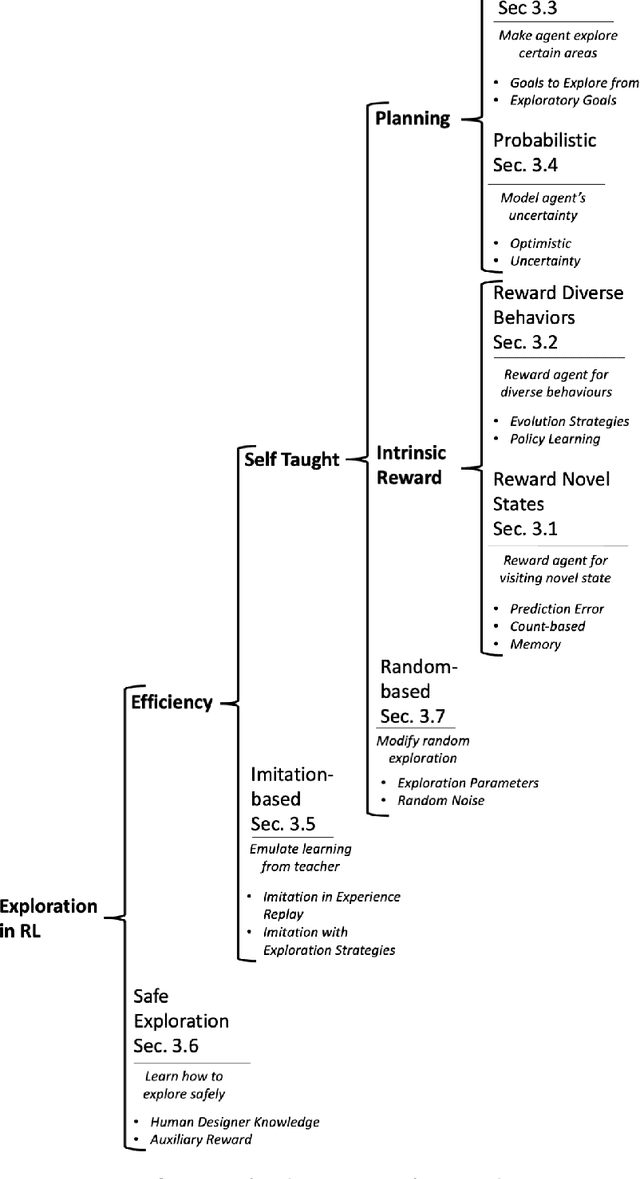
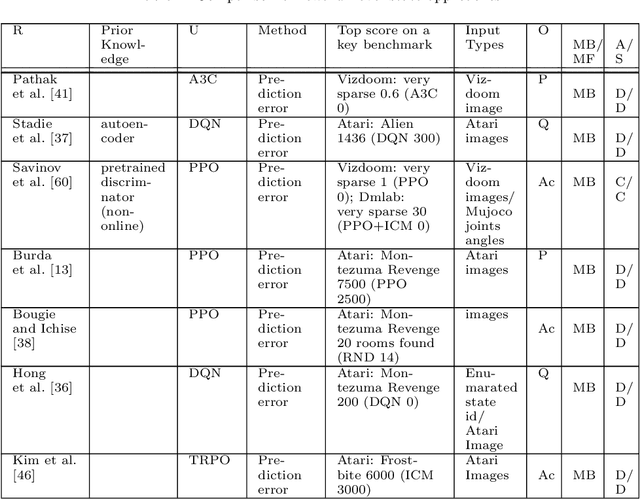

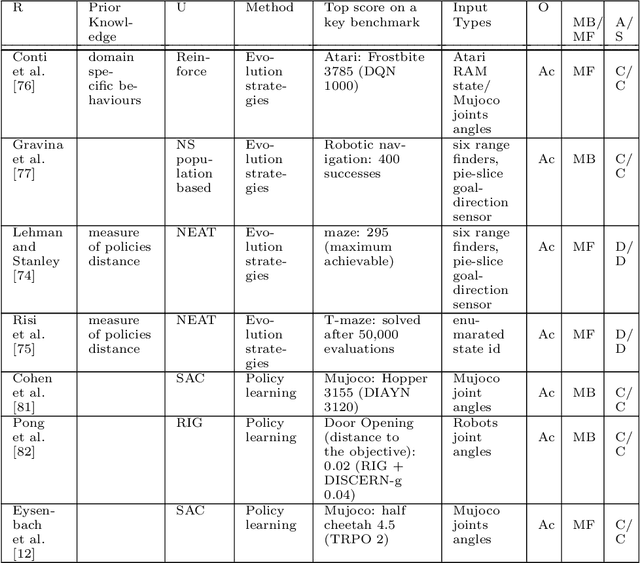
Abstract:This paper reviews exploration techniques in deep reinforcement learning. Exploration techniques are of primary importance when solving sparse reward problems. In sparse reward problems, the reward is rare, which means that the agent will not find the reward often by acting randomly. In such a scenario, it is challenging for reinforcement learning to learn rewards and actions association. Thus more sophisticated exploration methods need to be devised. This review provides a comprehensive overview of existing exploration approaches, which are categorized based on the key contributions as follows reward novel states, reward diverse behaviours, goal-based methods, probabilistic methods, imitation-based methods, safe exploration and random-based methods. Then, the unsolved challenges are discussed to provide valuable future research directions. Finally, the approaches of different categories are compared in terms of complexity, computational effort and overall performance.
 Add to Chrome
Add to Chrome Add to Firefox
Add to Firefox Add to Edge
Add to Edge